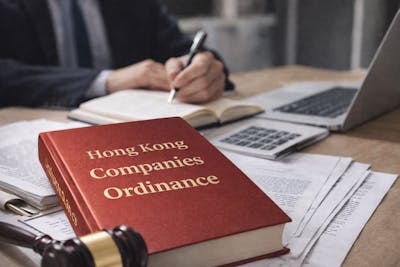Issuing shares refers to the creation of new shares by a Hong Kong company.
Allotting shares is the act of dispatching the newly created shares among existing and/or new shareholders.
The issuance and allotment of new shares is relatively straightforward for a Hong Kong company.
The process requires passing certain resolutions, filing a Form NSC1 with the Companies Registry, updating the Register of Members, and issuing new share certificates.
In Hong Kong, the Companies Ordinance mandates that every incorporated business must issue at least one share to the founder. This minimum shareholding reflects the flexibility provided by Hong Kong’s Private Limited Companies, which are limited by shares.
But what happens when a business requires additional capital to grow? Here, we’ll discuss the process of allotting shares in a private limited company, including the requirements and steps involved.
Share Allotment and Issue of Shares
A share represents a portion of a company's ownership, granting shareholders rights to dividends and potential capital gains. Hong Kong Private Limited Companies are popular due to their separate legal identity, which limits shareholder liability.
When establishing a Private Limited Company, investors determine the share structure, with a minimum of one share valued at HK$1 under the Companies Ordinance (Cap 622). These companies can have up to 50 shareholders and raise capital by issuing new shares.
Issue of shares refers to the creation and sale of new shares to raise capital. Companies issue shares to finance expansion, fund R&D, reduce debt, or strengthen financial flexibility.
Share allotment is the process of distributing newly issued shares to specific investors who apply to purchase them. This step follows the issuance of shares and finalizes the allocation.
Companies must ensure regulatory compliance when issuing and allotting shares. This includes updating the Annual Return with the Companies Registry to reflect shareholder and shareholding changes accurately.
Share Issuance vs. Share Transfer

- Share Transfers: This involves reallocating existing shares among current shareholders or others associated with the company.
- Share Issuance: This refers to the company issuing new shares to additional parties, who are then added to the shareholder register. Once registered, the shares are formally issued.
Pre-Conditions for Issuing Shares
Before issuing new shares, a Hong Kong Private Limited Company must meet several conditions:
Articles of Association (AoA): The company’s Articles of Association must be reviewed before issuing new shares, as they outline the specific procedures and shareholder rights involved. In most cases, all existing shareholders must unanimously agree before a new shareholder is introduced. Failure to comply with these provisions can lead to disputes or legal complications, potentially delaying or invalidating the share issuance process.
Annual Return Compliance: A company must be fully compliant with its statutory obligations before proceeding with share issuance or allotment. If a company has overdue filings, such as unsubmitted Annual Returns to the Companies Registry, it cannot complete the process until all outstanding filings are updated. Non-compliance with annual reporting requirements may result in penalties, legal restrictions, or even the inability to conduct corporate transactions.
Transparency is key during this process, as potential investors need to understand the company’s financial health, including any outstanding debts.
Who Decides to Allot Shares In a Hong Kong Company
Under the Hong Kong Companies Ordinance (Cap. 622), company directors may allot shares provided the company has granted prior approval through a formal resolution with a defined expiration date.
The approval for share allotment can be unconditional or subject to specific conditions. It may apply to a particular exercise of power or cover broader scenarios. Additionally, this approval can be revoked or amended through another company resolution at any time.
Situations Where Formal Resolution Approval Is Not Required
Directors can allocate shares without a formal resolution in the following cases:
- Pro Rata Offer to Members: Shares allotted as part of an offer made to existing members in proportion to their shareholdings.
- Bonus Share Issuance: Shares issued as bonuses to members, distributed based on their current shareholdings.
- Commitments to Founder Members: Shares allocated to a founder member based on commitments outlined in the company’s Articles of Association.
- Pre-Approved Rights: Share allotment in accordance with a right to subscribe or convert securities into shares, provided the original right was approved under Section 141 of the Ordinance.
Steps for Share Issuance and Allotment in Hong Kong

The process of issuing and allotting shares in Hong Kong involves compliance with strict legal requirements. Below are the key steps:
Step 1: Assess the Company’s Capital Needs
Evaluate the business’s financial requirements to determine the amount of capital needed for growth or operations. This involves detailed budgeting, forecasting, and considering market conditions. For non-IPO share issuance, this step includes identifying target investors and the number of shares to be issued.
Step 2: Obtain Stakeholders’ Approval
Under the Companies Ordinance (Cap. 622), directors must prepare a written resolution specifying the number and type of shares to be issued. This resolution is presented to shareholders, who may approve it by:
- Signing the proposal directly, or
- Voting in a meeting, where approval is granted based on a majority decision.
Additionally, the company must review its Articles of Association (AoA) to ensure compliance with any specific clauses or conditions.
Step 3: Execute Agreements and Process Payments
After approvals are obtained, a formal agreement is drafted and signed with the investors or underwriters. The investors then transfer the required funds to the company, completing the financial aspect of the transaction.
Methods for Issuing and Allotting Shares in Hong Kong
Companies in Hong Kong can issue and allot shares using several methods, depending on their goals and circumstances:
Initial Public Offerings (IPOs)
An IPO allows a private company to become publicly traded by offering its shares to the public through a stock exchange. This process involves working with underwriters and investment banks to determine the offer price and the number of shares. Once listed, the shares are sold to institutional and retail investors, marking the company’s transition to public ownership.
Rights Issues
This approach involves offering existing shareholders the option to purchase additional shares at a predetermined price, often below market value. Rights are typically distributed in proportion to current shareholdings, enabling shareholders to maintain their ownership percentage. Shareholders can either exercise their rights or sell them on the open market.
Private Placements
In private placements, shares are sold directly to a select group of investors in a private transaction. This method is often used to raise capital without undergoing the extensive regulatory and public scrutiny associated with an IPO. Terms, including the price and number of shares, are negotiated between the company and investors.
Post-Allotment Obligations for Hong Kong Companies
After shares are issued and allotted, companies must fulfill the following obligations:
1. Submit the Return of Allotment
Within one month of share allotment, companies must file Form NSC1 – Return of Allotment with the Companies Registry. This form should include:
- Number of shares allotted
- Names and addresses of allottees
- Any increase in share capital resulting from the allotment
- Updated statement of capital, detailing share structure and shareholder identities
Failure to file on time may result in penalties. Extensions can be requested for unavoidable delays.
2. Update the Register of Members
Within two months of the allotment, the company must update the register of members with:
- Members’ names and addresses.
- Dates of membership commencement and cessation.
- Specific shares held by each member.
- Payment details for the shares.
3. Issue Share Certificates
Share certificates must be prepared and delivered within two months of the allotment. The details on these certificates must align with the information filed in the Return of Allotment.
Penalties for Non-Compliance

Failure to complete the required filings, register updates, or certificate issuance may result in:
- A fine of up to HK$25,000 for the company and responsible individuals.
- An additional HK$700 fine for each day the offense continues.
For guidance and assistance with share issuance in Hong Kong, consult professional company secretarial services to ensure compliance and accuracy.
Shareholder Rights in Hong Kong
Shareholder rights are typically outlined in the company’s Articles of Association and may include:
- Receiving dividends from surplus profits.
- Accessing remaining company assets upon dissolution after debts are cleared.
- Voting rights, which depend on the type of shares issued (e.g., voting or non-voting shares).
- Receiving financial documents, including audited reports and circulars.
Need Assistance?
Understanding the share issuance process can be complex, and professional guidance is highly recommended. Contact Air Corporate today to consult our expert Company Secretaries for tailored assistance.






